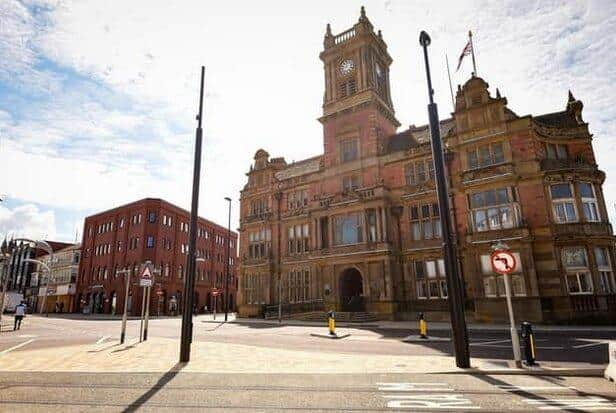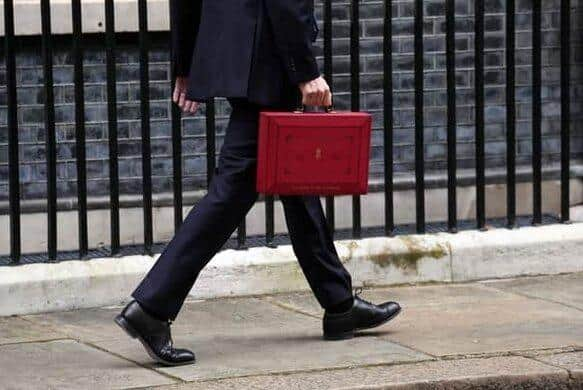Blackpool would be '£34m better off' under proposal to redistribute proportion of income tax to poorer areas
and live on Freeview channel 276
The idea - contained in the recently-published “Funding Fair Growth” report by the Centre for Progressive Policy (CPP) - would devolve two percent of income tax receipts to local authorities.
Half of the total would be kept by the top-tier council in the area where it was generated, while 40 percent would be divvied out nationwide and the remaining 10 percent invested in rebuilding local government capacity in what the organisation calls “lagging areas”.
Advertisement
Hide AdAdvertisement
Hide AdIllustrative modelling by the CPP estimates that, under the suggested scheme, Blackpool Council would reap the rewards of the redistributive element of the proposal - getting an annual £34m boost to its coffers. Almost 82 percent of the town’s extra revenue would come from the redistribution pot - more than any other area nationwide - with just £6.1m being generated by the additional one percent of locally-raised retained income tax cash.


Meanwhile, Lancashire County Council would see an annual £118.7m uplift - the eighth-highest cash increase in the country.
Blackburn with Darwen Council would get a similar boost from redistribution to its fellow standalone authority, Blackpool, with almost 76 percent of the former’s forecast extra £26.8m arising from that element of the proposal.
There would be a more equal split between the two sources of additional funding in the case of the county council - with just over 52 percent coming from retention and the remainder from the retained share of revenue raised within its patch.
Advertisement
Hide AdAdvertisement
Hide AdHowever, the deputy leader of Conservative-controlled County Hall is unconvinced about the blueprint. County Cllr Alan Vincent, who is also the cabinet member for resources, told The Gazette that while local authority budgets would seemingly get the massive uplift that many in local government have long called for, the resultant gap left in Whitehall’s coffers would have to be plugged.


“This [proposal] is nice in theory, but would leave a hole in central government finances which would have to be filled by raising tax in some other way - or, more likely, simply [by] reducing the amount they give in grant to local authorities, so the net effect would be neutral,” County Cllr Vincent suggested.
Blackpool Council was also approached for comment.
Under the current tax system, 95 percent of all taxation raised in the UK goes straight to the Exchequer.
The CPP acknowledges that it is not the first thinktank or group to call for local retention of a proportion of income tax, but says that it has gone “a step further” with the suggested redistribution that lies at the heart of its proposal.


Advertisement
Hide AdAdvertisement
Hide Ad“[This] redistributive mechanism [would] compensate poorer areas to help level the playing field, as well as ring-fencing a proportion of revenues in order to support the development of capacity in local areas facing acute staffing issues.
“The 40 percent redistributive element would also provide significant revenue boosts to poorer areas with weaker local economies.
"[The proposal] is broadly equivalent to allowing local areas to retain 1p in every £1 of these taxes locally while a further 40 percent (0.8p) is redistributed and the remaining 10 percent (0.2p) is ring-fenced to support capacity-building. the CPP report adds.
Its redistribution calculations are based on an illustrative scenario using a funding formula that considers factors including income deprivation and the percentage of the local labour force without an NVQ3 qualification - equivalent to A-Levels - or higher.


Advertisement
Hide AdAdvertisement
Hide AdIn two-tier areas like that covered by Lancashire County Council, the CPP proposes that the highest level of local government should act as the lead authority for income tax retention, but oversee spending based on “a pooling of revenues accrued through lower tiers [like Fylde and Wyre councils], in order to support more cohesive, cross-border local economic planning”.
The CPP says that the larger weighting towards retainment over redistribution within its proposal is designed to ensure that poorer areas which receive a higher proportion of redistributed funds “are not financially penalised for taking steps that encourage growth and raise tax receipts in their local economies”.
"With an equal weighting between retainment and redistribution, there is a risk that poorer areas that receive revenue through the redistributive element, but manage to encourage growth and therefore see higher tax receipts locally, see no overall increase to their revenue,” the report explains.
WHO WOULD GET WHAT?
This is how much additional annual revenue Lancashire’s local authorities would have access to under the CPP’s proposal:
Advertisement
Hide AdAdvertisement
Hide AdLancashire County Council - £118,756,389 (£56,516,887 from retention and £62,239,502 from redistribution)
Blackpool Council - £34,002,391 (£6,145,714 from retention and £27,856,677 from redistribution)
Blackburn with Darwen Council - £26,872,677 (£6,479,369 from retention and £20,393,308 from redistribution)
TOTAL EXTRA LOCAL GOVERNMENT FUNDING NATIONWIDE: £5.6bn
Source: CPP “Funding Fair Growth” report
HOW ELSE SHOULD LOCAL GOVERNMENT FUNDING BE REFORMED?
The government first promised to overhaul local authority financing back in 2016, but its so-called “fair funding review” has been repeatedly delayed ever since, along with related proposed reforms of the proportion of business rates that councils are able to retain for their own patches. Last December, it was announced that any changes would not come for at least two years, pushing them beyond the date of the next general election.
Advertisement
Hide AdAdvertisement
Hide AdIn addition to its local income tax retention and redistribution proposal, the Centre for Progressive Policy also recommends:
***devolving two percent of VAT and corporation tax to local government, using a similar system to that proposed forincome tax, as part of a wider push to raise spending at a sub-national level to 30 percent of total government expenditure;
***overhauling the system of local government finance in England, making multi-year finance settlements the default, consolidating existing and future local growth funding streams into a single pot of revenue and capital funding, and ending competitive bidding processes [which have been widely used in recent years to determine allocations from cash pots like the Towns Fund and Levelling Up Fund];
***establishing the likes of citizens’ juries or assemblies, along with other processes, to inform possible routes towards greater fiscal devolution in England.